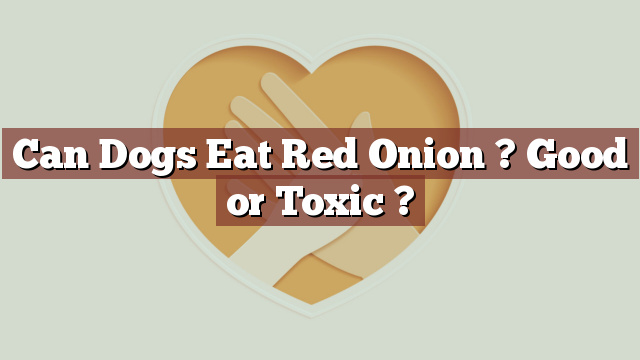Can Dogs Eat Red Onion? Good or Toxic?
Knowing what foods are safe for our beloved pets is essential in ensuring their overall health and well-being. One particular food that often raises questions is red onion. In this article, we will delve into the nutritional value of red onion, discuss its toxicity level for dogs, explore potential risks or benefits of red onion consumption, and provide guidance on what steps to take if your dog has ingested red onion.
Nutritional Value of Red Onion: Vitamins, Minerals, and Fiber
Red onions, like other onions, are known for their rich nutritional profile. They contain various vitamins such as vitamin C, B6, and folate. Additionally, red onions are a good source of minerals like potassium and manganese. Furthermore, they are packed with dietary fiber, which aids in digestion and helps regulate bowel movements.
Can Dogs Eat Red Onion? Understanding the Toxicity Level
Unfortunately, dogs should not consume red onion as it is toxic to them. Red onion, along with other members of the Allium family, contains a compound called N-propyl disulfide, which can cause damage to a dog’s red blood cells. This can lead to a condition known as hemolytic anemia, where the red blood cells are destroyed faster than they can be replaced.
Potential Risks or Benefits of Red Onion Consumption for Dogs
The risks associated with dogs consuming red onion are significant. Consumption of even small amounts of red onion can result in symptoms such as vomiting, diarrhea, abdominal pain, weakness, and lethargy. In severe cases, red onion toxicity can lead to a rapid onset of anemia and can be life-threatening for our furry friends.
On the other hand, there are no known benefits of dogs consuming red onion. Therefore, it is best to avoid feeding them this particular food altogether.
My Dog Ate Red Onion: Steps to Take for Their Safety
If you suspect that your dog has consumed red onion, it is crucial to act promptly to ensure their safety. Contact your veterinarian immediately and provide them with detailed information about the incident, including the approximate amount of red onion consumed and when it was ingested. Your vet may recommend inducing vomiting, administering activated charcoal, or other necessary treatments depending on the severity of the situation.
Remember, it is always better to be safe than sorry when it comes to our furry companions’ health.
Conclusion: Red Onion Should Be Avoided to Ensure Dog’s Health
In conclusion, dogs should not eat red onion as it is toxic to them. The compound found in red onion can cause damage to a dog’s red blood cells, leading to potentially life-threatening conditions. It is important to educate ourselves about which foods are safe for our pets and to always consult a veterinarian if we suspect our dog has ingested something harmful. By being vigilant and proactive, we can ensure the well-being and longevity of our beloved canine companions.
Thank you for investing your time in exploring [page_title] on Can-Eat.org. Our goal is to provide readers like you with thorough and reliable information about various dietary topics. Each article, including [page_title], stems from diligent research and a passion for understanding the nuances of our food choices. We believe that knowledge is a vital step towards making informed and healthy decisions. However, while "[page_title]" sheds light on its specific topic, it's crucial to remember that everyone's body reacts differently to foods and dietary changes. What might be beneficial for one person could have different effects on another. Before you consider integrating suggestions or insights from "[page_title]" into your diet, it's always wise to consult with a nutritionist or healthcare professional. Their specialized knowledge ensures that you're making choices best suited to your individual health needs. As you navigate [page_title], be mindful of potential allergies, intolerances, or unique dietary requirements you may have. No singular article can capture the vast diversity of human health, and individualized guidance is invaluable. The content provided in [page_title] serves as a general guide. It is not, by any means, a substitute for personalized medical or nutritional advice. Your health should always be the top priority, and professional guidance is the best path forward. In your journey towards a balanced and nutritious lifestyle, we hope that [page_title] serves as a helpful stepping stone. Remember, informed decisions lead to healthier outcomes. Thank you for trusting Can-Eat.org. Continue exploring, learning, and prioritizing your health. Cheers to a well-informed and healthier future!

